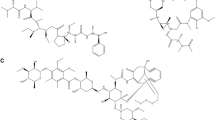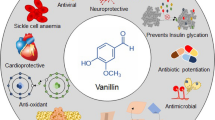Abstract
Phenoxodiol, a synthetic analog of the plant isoflavone genistein, represents a new generation of oncology drugs acting as multiple signal transduction regulators. Phenoxodiol exerts its effect mainly by the induction of apoptosis through multiple mechanisms resulting in degradation of antiapoptotic proteins, with increased levels being linked to chemoresistance in tumor cells. Preclinical studies with this agent showed promising anticancer activity leading to a potential role in the treatment of a wide range of solid and hematologic cancers. Early clinical studies, especially in chemotherapy-resistant ovarian cancer, showed minimal toxicity with minor antitumor activity. Hormone-refractory prostate cancer is another promising area in which phenoxodiol is being actively tested. Studies are ongoing to define the optimal use of this novel anticancer agent.
Similar content being viewed by others
References and Recommended Reading
Lamartiniere CA, Murrill WB, Manzolillo PA, et al.: Genistein alters the ontogeny of mammary gland development and protects against chemically-induced mammary cancer in rats. Proc Soc Exp Biol Med 1998, 217:358–364.
Adlercreutz H, Mazur W: Phyto-oestrogens and Western diseases. Ann Med 1997, 29:95–120. Important review article about the relation between dietary isoflavone intake and lower cancer incidence, making the case for possible anticancer activity of these agents.
Schabath MB, Hernandez LM, Wu X, et al.: Dietary phytoestrogens and lung cancer risk. JAMA 2005, 294:1493–1504. Recent case-control study about the decreased incidence of lung cancer with dietary phytoestrogens.
Rauth S, Kichina J, Green A: Inhibition of growth and induction of differentiation of metastatic melanoma cells in vitro by genistein: chemosensitivity is regulated by cellular p53. Br J Cancer 1997, 75:1559–1566.
Spinozzi F, Pagliacci MC, Migliorati G, et al.: The natural tyrosine kinase inhibitor genistein produces cell cycle arrest and apoptosis in Jurkat T-leukemia cells. Leuk Res 1994, 18:431–439.
Peterson TG, Coward L, Kirk M, et al.: The role of metabolism in mammary epithelial cell growth inhibition by the isoflavones genistein and biochanin A. Carcinogenesis 1996, 17:1861–9.
Yanagihara K, Ito A, Toge T, Numoto M: Antiproliferative effects of isoflavones on human cancer cell lines established from the gastrointestinal tract. Cancer Res 1993, 53:5815–21.
Naik HR, Lehr JE, Pienta KJ: An in vitro and in vivo study of antitumor effects of genistein on hormone refractory prostate cancer. Anticancer Res 1994, 14:2617–2619.
Schweigerer L, Christeleit K, Fleischmann G, et al.: Identification in human urine of a natural growth inhibitor for cells derived from solid paediatric tumours. Eur J Clin Invest 1992, 22:260–264.
Choi YH, Zhang L, Lee WH, Park KY: Genistein-induced G2/M arrest is associated with the inhibition of cyclin B1 and the induction of p21 in human breast carcinoma cells. Int J Oncol 1998, 13:391–396.
Harper A, Kerr DJ, Gescher A, Chipman JK: Antioxidant effects of isoflavonoids and lignans, and protection against DNA oxidation. Free Radic Res 1999, 31:149–160.
Kyle E, Neckers L, Takimoto C, et al.: Genistein-induced apoptosis of prostate cancer cells is preceded by a specific decrease in focal adhesion kinase activity. Mol Pharmacol 1997, 51:193–200.
Fotsis T, Pepper M, Adlercreutz H, et al.: Genistein, a dietary ingested isoflavonoid, inhibits cell proliferation and in vitro angiogenesis. J Nutr 1995, 125:790S-797S.
Joussen AM, Rohrschneider K, Reichling J, et al.: Treatment of corneal neovascularization with dietary isoflavonoids and flavonoids. Exp Eye Res 2000, 71:483–487.
Bergan R, Kyle E, Nguyen P, et al.: Genistein-stimulated adherence of prostate cancer cells is associated with the binding of focal adhesion kinase to beta-1-integrin. Clin Exp Metastasis 1996, 14:389–398.
Swanton C: Cell-cycle targeted therapies. Lancet Oncol 2004, 5:27–36.
Newcomb EW: Flavopiridol: pleiotropic biological effects enhance its anti-cancer activity. Anticancer Drugs 2004, 15:411–419.
Schwartz GK, Ilson D, Saltz L, et al.: Phase II study of the cyclin-dependent kinase inhibitor flavopiridol administered to patients with advanced gastric carcinoma. J Clin Oncol 2001, 19:1985–1992.
Shapiro GI, Supko JG, Patterson A, et al.: A phase II trial of the cyclin-dependent kinase inhibitor flavopiridol in patients with previously untreated stage IV non-small cell lung cancer. Clin Cancer Res 2001, 7:1590–1599.
Kouroukis CT, Belch A, Crump M, et al.: Flavopiridol in untreated or relapsed mantle-cell lymphoma: results of a phase II study of the National Cancer Institute of Canada Clinical Trials Group. J Clin Oncol 2003, 21:1740–1745.
Byrd JC, Peterson BL, Gabrilove J, et al.: Treatment of relapsed chronic lymphocytic leukemia by 72-hour continuous infusion or 1-hour bolus infusion of flavopiridol: results from Cancer and Leukemia Group B study 19805. Clin Cancer Res 2005, 11:4176–4181.
Schwartz GK, O’Reilly E, Ilson D, et al.: Phase I study of the cyclin-dependent kinase inhibitor flavopiridol in combination with paclitaxel in patients with advanced solid tumors. J Clin Oncol 2002, 20:2157–2170.
Constantinou A, Huberman E: Genistein as an inducer of tumor cell differentiation: possible mechanisms of action. Proc Soc Exp Biol Med 1995, 208:109–115.
Ravindranath MH, Muthugounder S, Presser N, Viswanathan S:Anticancer therapeutic potential of soy isoflavone, genistein. Adv Exp Med Biol 2004, 546:121–165.
Constantinou AI, Husband A: Phenoxodiol (2H-1-benzopyran-7-0,1,3-(4-hydroxyphenyl)), a novel isoflavone derivative, inhibits DNA topoisomerase II by stabilizing the cleavable complex. Anticancer Res 2002, 22:2581–2585.
Kamsteeg M, Rutherford T, Sapi E, et al.: Phenoxodiol—an isoflavone analog—induces apoptosis in chemoresistant ovarian cancer cells. Oncogene 2003, 22:2611–2620. One of the first papers to describe the in vivo antiapoptotic effects of phenoxodiol in chemoresistant malignancies.
Sapi E, Alvero AB, Chen W, et al.: Resistance of ovarian carcinoma cells to docetaxel is XIAP dependent and reversible by phenoxodiol. Oncol Res 2004, 14:567–578.
Straszewski-Chavez SL, Abrahams VM, Funai EF, Mor G:X-linked inhibitor of apoptosis (XIAP) confers human trophoblast cell resistance to Fas-mediated apoptosis. Mol Hum Reprod 2004, 10:33–41.
Aguero MF, Facchinetti MM, Sheleg Z, Senderowicz AM:Phenoxodiol, a novel isoflavone, induces G1 arrest by specific loss in cyclin-dependent kinase 2 activity by p53-independent induction of p21WAF1/CIP1. Cancer Res 2005, 65:3364–3373.
Min J, Stegner AL, Alexander H, Alexander S: Overexpression of sphingosine-1-phosphate lyase or inhibition of sphingosine kinase in Dictyostelium discoideum results in a selective increase in sensitivity to platinum-based chemotherapy drugs. Eukaryot Cell 2004, 3:795–805.
Constantinou AI, Mehta R, Husband A: Phenoxodiol, a novel isoflavone derivative, inhibits dimethylbenz[a]anthracene (DMBA)-induced mammary carcinogenesis in female Sprague-Dawley rats. Eur J Cancer 2003, 39:1012–1018.
Joshua AM, Ong S, Noney L, et al.: Phase 1 dose-escalation of phenoxodiol in patients with advanced cancer [abstract]. Proc AACR 2003, 225:902. Early phase I clinical study of phenoxodiol in refractory malignancies showing minimal toxicity.
Rutherford T, O’Malley D, Makkenchery A, et al.: Phenoxodiol phase Ib/II study in patients with recurrent ovarian cancer that are resistant to > second line chemotherapy [abstract]. Proc AACR 2004, 45:4457. Phase I/II trial of phenoxodiol in the setting of refractory/recurrent ovarian cancer showing a promising clinical benefit.
Kelly G: Interim results of a phase Ib/IIa study of oral phenoxodiol in patients with late-stage, hormonerefractory prostate cancer [abstract]. Proc AACR 2004, 45:LB-214. Phase I/II trial of phenoxodiol in the setting of hormone-refractory prostate cancer showing a promising disease stabilization at 37%.
Author information
Authors and Affiliations
Corresponding author
Rights and permissions
About this article
Cite this article
Choueiri, T.K., Wesolowski, R. & Mekhail, T.M. Phenoxodiol: Isoflavone analog with antineoplastic activity. Curr Oncol Rep 8, 104–107 (2006). https://doi.org/10.1007/s11912-006-0044-2
Issue Date:
DOI: https://doi.org/10.1007/s11912-006-0044-2




